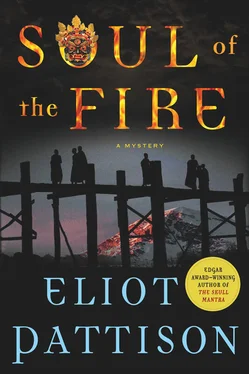Eliot Pattison - Soul of the Fire
Здесь есть возможность читать онлайн «Eliot Pattison - Soul of the Fire» весь текст электронной книги совершенно бесплатно (целиком полную версию без сокращений). В некоторых случаях можно слушать аудио, скачать через торрент в формате fb2 и присутствует краткое содержание. Год выпуска: 0101, ISBN: 0101, Издательство: St. Martin, Жанр: Полицейский детектив, на английском языке. Описание произведения, (предисловие) а так же отзывы посетителей доступны на портале библиотеки ЛибКат.
- Название:Soul of the Fire
- Автор:
- Издательство:St. Martin
- Жанр:
- Год:0101
- ISBN:9781250036476
- Рейтинг книги:4 / 5. Голосов: 1
-
Избранное:Добавить в избранное
- Отзывы:
-
Ваша оценка:
- 80
- 1
- 2
- 3
- 4
- 5
Soul of the Fire: краткое содержание, описание и аннотация
Предлагаем к чтению аннотацию, описание, краткое содержание или предисловие (зависит от того, что написал сам автор книги «Soul of the Fire»). Если вы не нашли необходимую информацию о книге — напишите в комментариях, мы постараемся отыскать её.
Soul of the Fire — читать онлайн бесплатно полную книгу (весь текст) целиком
Ниже представлен текст книги, разбитый по страницам. Система сохранения места последней прочитанной страницы, позволяет с удобством читать онлайн бесплатно книгу «Soul of the Fire», без необходимости каждый раз заново искать на чём Вы остановились. Поставьте закладку, и сможете в любой момент перейти на страницу, на которой закончили чтение.
Интервал:
Закладка:
No religion on earth used more signs and symbols than Tibetan Buddhism, and Shan had learned many glyphs, but not this one. It was an oval with a crescent shape intersecting the upper right edge, bending forward. He stared so intently, struggling to understand the fading sign, that he did not realize two more knobs had entered the truck until they began leading Lokesh away.
Without thinking, he reached out and grabbed the arm of the nearest guard and then, realizing what he had done, reflexively bent to receive the blow that would surely come. The soldier shook Shan off and laughed.
He gazed in despair but also confusion as the knobs escorted Lokesh into the second truck, then he leapt forward and managed to get within several feet of his old friend before the knobs seized him. “Loooo-kesh!” he cried.
His friend gazed back at Shan with impossible serenity. “Lha gyal lo,” the old man called back as the guards shoved him inside the truck. It was the mantra of battered Tibetans: May the gods be victorious.
Suddenly Shan was alone with the knobs. They did not present the expected manacles, did not produce the usual batons, only motioned him with bored expressions toward a metal door. They climbed a dank cinder block stairwell, exiting into a brightly lit hallway of offices beside a washroom. The officer opened the door and pointed to a row of pegs on the wall. “Five minutes,” he announced, then stepped back into the hall. They had a different punishment in mind for Shan.
Shan stared at the door as it swung closed, then at the white shirt and grey slacks on the pegs. He knew from agonizing experience that Public Security was at its most treacherous when it did the unexpected. Something very disturbing was happening, something that hinted of a permanent shift in his life, which he desperately did not want. The few hardened criminals who served among the aging political prisoners of his gulag prison had told Shan that there was always a final run point, a place where a prisoner could still flee before the state’s iron grip closed around him. Shan could still run, could lose himself in this strange office building. But he would never be able to help Lokesh by resisting or fleeing. He forced himself to step to the sink to wash off the stench of the meat wagon and began unbuttoning his shirt.
A new escort awaited him in the corridor-a short, lean man in his thirties with long, carefully groomed hair-wearing a suit and tie. “My name is Tuan Yangdong. I am here to assist you, Comrade Shan,” he offered in an earnest tone, and gestured down the hall.
Shan responded with only a nod.
“You must be excited to have this opportunity,” Tuan offered as they walked.
“I would be excited to be back in my ditch in Lhadrung,” Shan replied. Tuan looked at him uncertainly, shrugged, and remained silent as he led Shan to a corner conference room. It was midafternoon, and they were high enough above the ground for an unobstructed view of their surroundings. Shan quickly stepped to the row of windows and found himself overlooking a large compound of nearly identical grey buildings. As his escort poured tea from a large thermos, Shan looked back at the door. It had no locks.
“You have me confused with someone else,” Tuan suggested as he extended a steaming cup to Shan.
“You mean a different Public Security Bureau?” Shan asked. “If you want to help, then tell me where my friend is going.”
Tuan shrugged again. “I am just with the Religious Affairs.”
Shan hesitated. The Bureau of Religious Affairs was the agency that strictly, often ruthlessly, regulated the practice of Buddhism in Tibet. “Half those working for Religious Affairs are seconded from Public Security. Does that include you, Comrade Tuan?”
The question caught Tuan off guard. “Not exactly,” he said awkwardly. “Not anymore. The Party says we must consider Public Security like a college,” he offered with surprising candor. “Religious Affairs officers are encouraged to spend two or three years with Public Security to better understand the challenges the motherland faces in Tibet.” A small, tentative smile appeared on his face. “You seem well versed in the ways of the government for one brought in from such a remote county as Lhadrung.”
When Shan gave no reply, Tuan sighed and busied himself straightening a stack of tablets on a side table. Shan turned back to the windows. They were in a town that was dominated by a dozen four-story glass and concrete buildings and surrounded by a high wall of painted cinder blocks. It was one of the self-contained enclaves for government workers that were being erected all over Tibet, cornerstones for Beijing’s expanding structure in the region. Inside the walls would be command centers, offices, apartments, and even shops and cafés for the bureaucrats shipped in from the east.
“Welcome to Zhongje,” Tuan said over his shoulder. “A model town, a settlement of the new age designed to meet all the needs of its residents. Just rocks and grazing sheep three years ago, and now look-a showcase for the motherland!” He pointed out the small square planted with spindly trees that was the town park, an electrical substation, a constable post by the gate, a compound of garages with street maintenance equipment, even a town incinerator. “A taste of what waits all loyal Tibetans.”
Shan stepped to the windows facing north, pulled back the drapes that obscured them, and froze. On the adjacent slope, less than a mile away, there was another, much larger walled compound.
Suddenly Shan knew where he was. Sangpu Abbey had once been the home of one of the largest Buddhist colleges in Tibet, where scores of lamas trained thousands of novices for the spiritual life. But in the early years of the Chinese occupation, it was converted into the largest prison in Tibet and renamed Longtou, Chinese for Head of the Dragon. Its meditation chambers had been stripped to bare stone and used for solitary confinement, its chapels transformed into squalid cell blocks. Shan himself had spent several days behind its bars before being assigned to his death camp in Lhadrung County. His gaze fell on the long, low mounds that cascaded down the slope below the prison. A casual observer might dismiss them as old bunkers or terraces, but Shan had been assigned to a work crew clearing a path for a new road being cut through the mounds. When Beijing had begun crushing the Tibetan Buddhist establishment, Sangpu was one of its starting places. Shan had worked with a horse cart, gathering bones from an exposed mound for shipment to a fertilizer factory. The monks of the abbey had been lined up by the open pits and mown down with machine guns. He recalled now the positioning of the mounds and with a shudder, realized that those near the bottom of the slope had been leveled for construction of the Chinese town. Zhongje, it was called, meaning Peace and Justice.
The tap of a spoon on a porcelain cup broke the silence. Shan turned to discover a Tibetan man and two Chinese women seated at the table, staring at him. Tuan sat along the wall beside a sinewy, balding man in a knob officer’s uniform who was lighting a cigarette. A row of overhead lights had been switched on, casting circles of harsh light on the table. Here at last was his interrogation team.
A file folder had been placed before the chair in front of Shan. He dutifully sat, sensing now the familiar ground. Inside would be a list of his crimes and a confession ready for his signature.
“I am Commissioner Choi,” the elder of the two women announced in a stern voice. “You are Comrade Shan Tao Yun of Beijing and Lhadrung County.”
“Just Lhadrung County,” he replied in a flat voice. “Beijing was another life.” The woman who spoke, in her late forties with her hair tightly tied at the nape, had the air of an austere professor, the younger woman at her side that of an attentive student. The Tibetan man, in an ill-fitting business suit, was anxiously watching the two men seated at the wall.
Читать дальшеИнтервал:
Закладка:
Похожие книги на «Soul of the Fire»
Представляем Вашему вниманию похожие книги на «Soul of the Fire» списком для выбора. Мы отобрали схожую по названию и смыслу литературу в надежде предоставить читателям больше вариантов отыскать новые, интересные, ещё непрочитанные произведения.
Обсуждение, отзывы о книге «Soul of the Fire» и просто собственные мнения читателей. Оставьте ваши комментарии, напишите, что Вы думаете о произведении, его смысле или главных героях. Укажите что конкретно понравилось, а что нет, и почему Вы так считаете.












